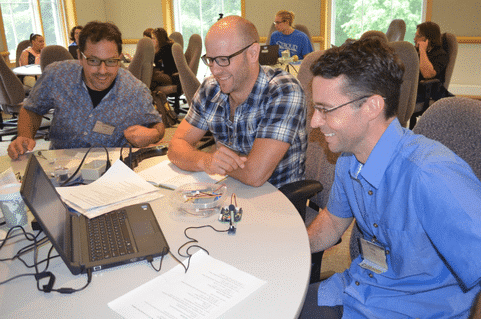
Learn Do-It-Yourself Electronics for Environmental Monitoring

- What: EnviroDIY Workshop
- When: August 13 and 14, 2024, from 8:30 a.m. to 5 p.m.
- Where: Stroud Water Research Center, 970 Spencer Road, Avondale, PA 19311
- Audience: Beginners and those with intermediate experience programming data loggers and using environmental monitoring equipment. State and federal agency staff; academic faculty; high school, undergraduate, and graduate students; and researchers from environmental NGOs and watershed organizations have attended previous workshops.
- Cost: $135 per person.
- Registration is required and limited to 24 participants.
EnviroDIY empowers researchers with innovative digital and electronic tools and training that enable cost-effective and customizable environmental measurements.
This workshop will help you learn the skills necessary to assemble, program, and deploy a water monitoring station, but with the understanding that the DIY journey has just begun! We can’t cover the wide world of DIY technologies in a single workshop, but we’ll give you the foundational knowledge and resources to continue learning on your own.
What Will the Workshop Cover?
- Programming electronic data loggers and connecting them to environmental sensors.
- Transmitting data from data loggers to web-based data portals via cellular radio.
- Assembling data loggers, sensors, cellular radios, and solar panels into monitoring stations.
- Deploying, maintaining, and troubleshooting monitoring stations.
What Are the Prerequisites?
You should answer yes to all of the following questions and be comfortable using spreadsheet software. You don’t need prior computer programming experience.
- Do you need more customized or less expensive monitoring equipment than commercial vendors provide?
- Do you enjoy learning hands-on electronic skills, computer coding, and web-based tools?
- Are you motivated to continue learning DIY skills on your own using internet resources?
- Can you accommodate the extra work required for DIY versus commercially available products?
What Do I Need to Bring?
We loan attendees all of the electronics and hardware needed to follow the classroom curriculum. You should wear comfortable clothes and shoes for walking trails along White Clay Creek. Lunch will be provided.
What Should I Expect From the Workshop?
- You’ll get hands-on experience using data loggers, sensors, cellular radios, and laptop computers.
- You’ll work in groups of two to program and assemble the provided electronic hardware.
- You’ll learn how to find and use online resources on your own after the workshop.
What Should I Not Expect From the Workshop?
- You won’t get one-on-one support from the Stroud Center after the workshop. We can’t guarantee your ability to monitor exactly where or how you want.
- You won’t be an expert on DIY electronics after the workshop.
- You won’t learn how to make or fix sensors.
Agenda
Tuesday, August 13, 2024
| 8:30 a.m. to 9 a.m. | Arrival |
| 9 a.m. to 9:15 a.m. | Welcome and introduction to do-it-yourself technologies |
| 9:15 a.m. to 10:15 a.m. | Arduino Interactive Development Environment and the Mayfly Data Logger** |
| 10:15 a.m. to 10:30 a.m. | Break |
| 10:30 a.m. to 12 p.m. | Simple sensors |
| 12 p.m. to 1 p.m. | Lunch (provided: hoagies*, chips, fruit, and drinks); overview of the Stroud Center |
| 1 p.m. to 2 p.m. | Sensors, power, and communication protocols |
| 2 p.m. to 3 p.m. | Data logging and data telemetry using cellular radio |
| 3 p.m. to 3:30 p.m. | Break |
| 3:30 p.m. to 5 p.m. | Assemble, program, and deploy temperature, conductivity, and depth monitoring stations |
| 5 to 5:30 p.m. | Optional activities: Configure your laptop for the Mayfly and Arduino Interactive Development Environment or take a tour of the Stroud Center |
Wednesday, August 14, 2024
| 8:30 a.m. to 9 a.m. | Arrival |
| 9 a.m. to 10:30 a.m. | Retrieve monitoring stations, explore the data, and learn about data quality assurance |
| 10:30 a.m. to 10:45 a.m. | Break |
| 10:45 a.m. to 12 p.m. | Using the Modular Sensors code repository to customize data logger configurations |
| 12 p.m. to 1 p.m. | Lunch (provided: sandwiches*, salads, and drinks) |
| 1 p.m. to 3:30 p.m. | Outdoor demonstration of monitoring station deployment best practices |
| 3:30 p.m. to 4 p.m. | Break |
| 4 p.m. to 5 p.m. | Questions and answers; open discussion |
| 5 p.m. to 5:30 p.m. | Optional: Tour of the Stroud Center |
*A selection of vegetarian, turkey, and ham sandwiches will be available.
**Attendees will be provided with laptop computers and the electronic hardware needed for workshop exercises.
Instructors
- Shannon Hicks, research engineer, Stroud Water Research Center.
- Scott Ensign, assistant director, vice president, and research scientist, Stroud Water Research Center.
Questions? Please email the instructors.
Presented by

